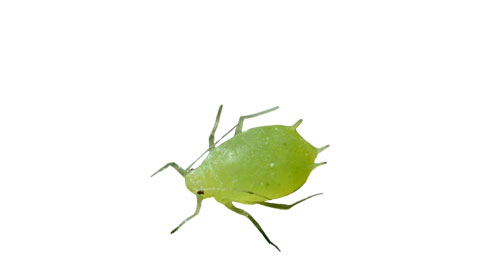Aphids
Aphids are probably the most-recognized garden insect in existence. They suck the sap from trees and plants causing the leaves to curl and die. Most of our Pacific Northwest trees are susceptible to aphid infestation. Several species of aphid can become problems on broad-leaved trees and shrubs. They’re often found when the temperature is warm but not hot – from 65 to 80 degrees Fahrenheit. Almost every plant has one or more aphid species that occasionally feeds on it. Most get their names from the plants they attack, i.e. the green peach aphid, the cabbage aphid, or the rose aphid.

General Information
Aphids come in a variety of species with more than 1,351 species of aphids currently recorded in the US and Canada, of which about 80 species are pests of food crops and ornamental plants. Colors vary by species, but popular ones are green, yellow, or white. A group called “wooly aphids” are covered in white, waxy substance that resembles cotton or fuzz. All are soft-bodied insects with piercing–sucking mouthparts. If you look closely at an aphid, you’ll see two small tubes projecting from their hind end. These are called cornicles and are unique to aphids. All types of aphids pierce the plant at its leaves and stems. They digest plant juices and excrete a sticky, sugary ‘honeydew’ liquid which attracts other garden insects.
Tiny and varied in color, these insects suck the juice of the plants to the point where the plants wilt, dehydrate and possibly die. They also spread viruses that can kill the plants. Some aphid species inject a toxin into plants, which further distorts growth. Small populations of aphids are generally not a major problem for gardeners; however, they are really fast at reproducing. Large populations can take over a crop if not controlled.
How Altus Pest Control Can Get Rid of Aphids
The key is careful monitoring and quick action when the pests become too numerous. It is evident that a familiarity with basic aphid biology is important for achieving satisfactory aphid management or control. Your Altus Pest Control technician will know how to evaluate your aphid problem, and will know how to best handle it for you. Aphids multiply quickly, so it’s important to get them under control before reproduction starts. Many generations can occur in one season.
Ants are often associated with aphid populations, especially on trees and shrubs, and often are a tip-off that an aphid infestation is present. If you see large numbers of ants climbing up your tree trunks, check for aphids (or other honeydew-excreting insects) on limbs and leaves. To protect their honeydew source, ants will ward off many of the aphid’s predators and parasites. Controlling ant populations is a key component of aphid management.
Our specialists are local, and know all of the variables that contribute to local pest activity in the Pacific Northwest. Our knowledge of the area can help diagnose any pest problem that’s bugging you.
Call us for a free quote at (541) 709-5033
